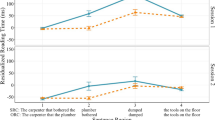Abstract
This squib reports the results of two experimental studies, a binary choice and a self-paced reading study, that provide strong support for the hypothesis in Tunstall (PhD thesis, 1998) that the distinct scopal properties of each and every are at least to some extent the consequence of an event-differentiation requirement contributed by each (Tunstall herself conducted an experiment that did not reveal the predicted effect). However, we also show that the emerging picture is more complex than Tunstall suggests: English speakers seem to fall into at least three groups regarding the scopal properties of each and every.
Similar content being viewed by others
References
Allen, R. 2008. Pocket Fowler’s modern English usage. Oxford: Oxford University Press.
Altmann G., Steedman M. (1988) Interaction with context during human sentence processing. Cognition 30: 191–238
Anderson, C. 2004. The structure and real-time comprehension of quantifier scope ambiguity. PhD thesis, Northwestern University.
Barr D. J., Levy R., Scheepers C., Tily H. J. (2013) Random effects structure for confirmatory hypothesis testing: Keep it maximal. Journal of Memory and Language 68: 255–278
Bates, D., M. Maechler, B. Bolker, and S. Walker. 2014. lme4: Linear mixed-effects models using Eigen and S4. R package version 1.1–6.
Beghelli, F., and T. Stowell. 1997. Distributivity and negation. In Ways of scope taking, ed. A. Szabolcsi, 71–109. Dordrecht: Kluwer.
Carden G. (1970) A note on conflicting idiolects. Linguistic Inquiry 1(3): 281–290
Carlson G. (1984) On the role of thematic roles in linguistic theory. Linguistics 22: 259–279
Crain, S., and M. Steedman. 1985. On not being led up the garden path: The use of context by the psychological syntax processor. In Natural language parsing: Psychological, computational and theoretical perspectives, ed. L. K. David Dowty and A. Zwicky, 320–358. Cambridge: Cambridge University Press.
Dowty, D. R. 1979. Word meaning and Montague grammar: The semantics of verbs and times in generative semantics and in Montague's PTQ. Dordrecht: Reidel.
Fodor, J. D. 1982. The mental representation of quantifiers. In Processes, beliefs and questions, ed. S. Peters and E. Saarinen, 129–164. Dordrecht: Reidel.
Gelman, A., and J. Hill. 2007. Data analysis using regression and multilevel/hierarchical models (Analytical methods for social research). Cambridge: Cambridge University Press.
Gil D. (1982) Quantifier scope, linguistic variation, and natural language semantics. Linguistics and Philosophy 5(4): 421–472
Hackl M., Koster-Hale J., Varvoutis J. (2012) Quantification and ACD: Evidence from real-time sentence processing. Journal of Semantics 29(2): 1–62
Hovav, M. R., and B. Levin. 1998. Building verb meanings. In The projection of arguments: Lexical and compositional factors, ed. M. Butt and W. Geuder, 97–134. Stanford: CSLI.
Ioup, G. 1975. Some universals for quantifier scope. In Syntax and semantics, ed. J. Kimball, vol. 4, 37–58. New York: Academic Press.
Just M. A., Carpenter P. A., Woolley J. D. (1982) Paradigms and processes in reading comprehension. Journal of Experimental Psychology: General 111(2): 228–238
Kratzer, A. 2005. Building resultatives. In Event arguments: Foundations and applications, ed. C. Maienborn and A. Wöllstein-Leisten, 177–212. Tübingen: Max Niemeyer Verlag.
Krifka, M. 1989. Nominal reference, temporal constitution, and quantification in event semantics. In Semantics and contextual expressions, ed. R. Bartsch, J. van Bentham, and P. van Emde Boas. Dordrecht: Foris.
Kroch, A. 1974. The semantics of scope in English. PhD thesis, MIT.
Kurtzman H. S., MacDonald M. C. (1993) Resolution of quantifier scope ambiguities. Cognition 48: 243–279
Landman, F. 2000. Events and plurality: The Jerusalem lectures. Dordrecht: Kluwer.
Plummer, M. 2013. rjags: Bayesian graphical models using MCMC. R package version 3–10.
Pustejovsky, J. 1995. The generative lexicon. Cambridge, MA: MIT Press.
Pylkkänen, L., and B. McElree. 2006. The syntax–semantic interface: On-line composition of sentence meaning. In Handbook of psycholinguistics, ed. M. Traxler and M. A. Gernsbacher, 537–577. New York: Elsevier.
R Core Team. 2014. R: A language and environment for statistical computing. Vienna, Austria: R Foundation for Statistical Computing.
Rayner K. (1998) Eye movements in reading and information processing: 20 years of research. Psychological Bulletin 124: 372–422
Reinhart, T. 2006. Interface strategies: Optimal and costly computations. Cambridge, MA: MIT Press.
Trueswell J., Tanenhaus M., Garnsey S. (1994) Semantic influences on parsing: Use of thematic role information in syntactic ambiguity resolution. Journal of Memory and Language 33: 285–318
Tunstall, S. 1998. The interpretation of quantifiers: Semantics and processing. PhD thesis, University of Massachusetts, Amherst
VanLehn, K. A. 1978. Determining the scope of English quantifiers. Technical Report. Cambridge, MA: MIT.
Vendler, Z. 1962. Each and every, any and all. Mind 71(282): 145–160.
Author information
Authors and Affiliations
Corresponding author
Rights and permissions
About this article
Cite this article
Brasoveanu, A., Dotlačil, J. Strategies for scope taking. Nat Lang Semantics 23, 1–19 (2015). https://doi.org/10.1007/s11050-014-9109-1
Published:
Issue Date:
DOI: https://doi.org/10.1007/s11050-014-9109-1




